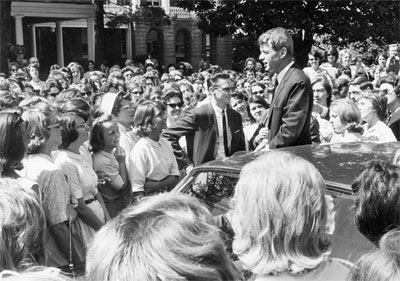Robert Kennedy’s May 1964 trip to Farmville is a watershed moment in the local history of the civil rights movement.
In honor of the 50th anniversary of Kennedy’s visit, the second annual Dr. C.G. Gordon Moss Lecture features Dr. Patricia Sullivan, professor of history at the University of South Carolina. Her lecture, "From Prince Edward County to Bedford-Stuyvesant: Robert Kennedy’s Civil Rights Journey," is scheduled for Thursday, Oct. 23, at 7:30 p.m. in Wygal Auditorium. It is free and open to the public.
Kennedy visited Farmville to review the Free Schools, a privately funded joint state and national effort that had gathered momentum under his leadership. The Free Schools provided education for students in 1963-64, during the five-year period Prince Edward County closed its schools in an attempt to avoid integration. The attorney general’s arrival sparked the gathering of a large crowd on High Street, including many Longwood students, and he paused there to give an impromptu speech.
The Griffin v. County School Board of Prince Edward case, decided just weeks after Kennedy’s visit, forced the county to reopen public schools in 1964, and his local legacy as a champion of civil rights has remained.
Sullivan, whose most recent book, Lift Every Voice: The NAACP and the Making of the Civil Rights Movement, is the first history of the formative decades of the nation’s oldest civil rights organization, will explore Kennedy’s life and political evolution in the Moss Lecture. Her ongoing book project tells the story of how Kennedy was challenged and changed by the civil rights movement.
"Robert Kennedy’s response to the demands of the movement, his exposure to racial discrimination and urban poverty, and his evolving awareness of race as a formative force in America affected his public, private and political life in ways that have yet to be fully explored," said Sullivan. "Viewing Kennedy’s life and legacy through the lens of the civil rights movement, the book will reveal how one of our nation’s most important leaders was shaped by and in turn influenced his country’s most enduring struggle."
Sullivan taught at the University of Virginia and Harvard University before joining the faculty of the University of South Carolina. She and Waldo E. Martin Jr. are editors of the John Hope Franklin Series in African-American History and Culture, published by the University of North Carolina Press. Since 1997, Sullivan and Martin have codirected a National Endowment for the Humanities Summer Institute at Harvard’s W.E.B. DuBois Institute on teaching civil rights history.
C.G. Gordon Moss was a professor of history at Longwood College from 1944-69. He served as department chair from 1947-60 and dean of the faculty from 1960-64. During the school closings in Prince Edward County from 1959-64, Moss became an outspoken advocate of reopening the schools and of equality and justice for all Americans. The C.G. Gordon Moss Lecture features historians who study democracy, social justice and social activism in American history. The C.G. Gordon Moss Lecture is sponsored by the Longwood University Department of History, Political Science and Philosophy and the Office of Academic Affairs.



Leave a Comment